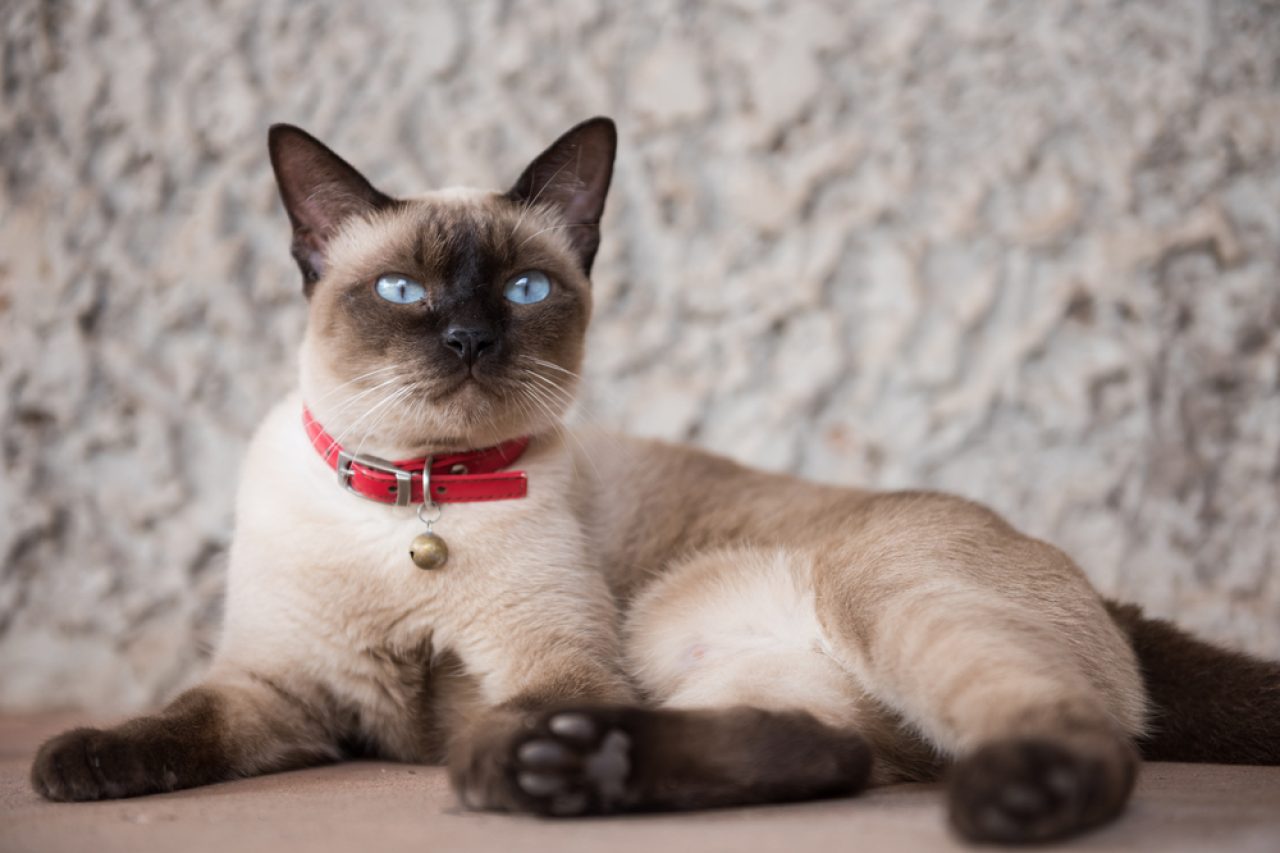📖 Table of Content:
With their piercing blue eyes, the beautiful Siamese cats have been capturing the hearts of many people through generations. Looks can sometimes be deceiving, however, and many believe that these beautiful felines can be pretty mean. So, are Siamese cats aggressive, or is it just a myth?
These irresistible kitties have quite a reputation in the feline world, and some think they’re hard to deal with. Now, I have to wonder if we’re all influenced by Disney’s famous “The Siamese cat song” where they are shown as villains; or are these beauties really devils in disguise?
It’s important to think about what you want from your feline companion, and what you consider bad behavior. Is it about not being affectionate enough? Is it about being too playful? Before you label your fluff as aggressive or mean, ask yourself if you’re simply expecting her to be something she’s not.
Picking the right breed for you and your expectations is crucial in creating a strong and healthy bond with your furry friend. Because of that, it’s important that you do your research and find out about the most common traits in the breed you set your eyes on. We’re here to help you with Siamese.
Most common behavior problems in Siamese cats
Before we agree on whether or not Siamese are aggressive, it’s important to understand some of the most common behavior problems when it comes to our favorite blue-eyed fluffs. Although these can apply to any cat, Siamese are more prone to displaying them.
If you feel like your fur baby is acting a bit more aggressive, you should pay attention to what could be the reason for it. It doesn’t mean that she’ll always be like that, and there’s a high possibility that she’s simply dealing with something that’s causing her to react aggressively.
So, before we answer the big “are Siamese cats aggressive” question, let’s see what are the most common behavior problems these beautiful felines showcase.
1. Separation anxiety
It’s possible that your fur bestie isn’t aggressive just because she’s mean, but because she’s missing her favorite human. I know, that seems completely contrary to the belief that Siamese cats are these mean felines that hate everyone. But, in reality, they’re highly prone to separation anxiety.
Once they get used to being around their parent, Siamese cats form a strong bond with them. Because of that, they have a hard time when their comfort person is away. Your blue-eyed friend truly loves and enjoys spending time with you, even if it doesn’t seem like it sometimes.
Once you’re gone, she might start feeling anxious. Siamese don’t like being alone for a long period of time and they might cause some problems in your home when you’re away. Don’t be surprised if you find your plants knocked over or your carpets rolled in ways you never thought possible.
Whether it’s out of spite or boredom, Siamese cats love causing damage. It’s like they have a secret sense that’s telling them what’s expensive and what’s not. There are a number of videos online showing Siamese knocking over expensive collections or scratching a perfectly nice new sofa.
So, next time you decide to leave your furry rebel alone, make sure to hide all your valuables somewhere she can’t reach them. If you don’t, you might find them under your sofa months later. If you want to avoid this, there are a couple of things you can do.
First, try not to leave your blue-eyed companion alone for too long. If there’s no way for you to change that, we suggest you think about bringing one more cat into your home. That way, your Siamese won’t spend too much time alone and, although she might miss you, she won’t feel lonely.
2. Social anxiety
If you’ve just adopted a Siamese kitten, make sure you give her enough opportunities to socialize. It’s crucial in making your fur friend feel comfortable in social situations in the future. The lack of socialization in their younger days can lead to the development of aggression once they enter adulthood.
Siamese are also known for being possessive and territorial. If they’re not used to being around people and other pets, they might attack them once they’re on their territory. This is one of the main reasons why Siamese cats are seen as aggressive.
So, if your kitty has been acting weird lately and you started wondering “Are Siamese cats aggressive, after all?”, think about the situation she’s in. Have you just welcomed a new pet into your home? Did you have a baby or just start a relationship with a new partner?
If your fur buddy’s been around for a while now, any change in her environment and the people around her can be a trigger. Especially if she wasn’t exposed to other people and animals as much in her kittenhood.
Since Siamese cats are so territorial, they love knowing who’s around them. If you plan on having more than one pet, it would be ideal if you could adopt them all as babies. If that’s not possible, make sure you take your time to introduce your pets and take all the necessary precautions.
Our favorite blue-eyed fluffs can get pretty jealous and they’ll never hesitate to show it. Because of that, it’s important to be patient and give them space. Let your fur queen be in control of the situation and respect her boundaries, but also make sure that you let her know she should respect yours, as well.
3. Insomnia
Your kitty’s beautiful blue eyes aren’t only special because of their color, but there’s also a specific genetic condition that contributes to your Siamese’s visual abnormalities. No, your mind wasn’t making things up – your feline’s eyes really are crossed.
Although this condition makes our unique furry companions even more adorable, it’s not the easiest thing to live with. Because they have reduced vision and rapid eye movement, they often feel frustrated; which, in turn, highly impacts their behavior.
They reportedly have night vision, too. How cool is that? Your very own fluffy superhero. Their visual abnormalities often result in disrupted sleep cycles and body rhythms. Because of this, a lot of cat parents reported their feline suffering from “insomnia”.
It doesn’t help that Siamese cats are naturally super hyper. Their energy combined with disrupted body rhythms makes these felines real night owls. Because of that, don’t be surprised if you wake up in the middle of the night with your kitty jumping off walls or knocking things down.
If your furbaby is acting weird compared to your friend’s sweet kitty, don’t give her a hard time. She’s probably scared because of her diminished vision or frustrated because of eye discomfort. Plus, she’s really hyper by nature! Your furriend simply loves running around when you’re deep in your sleep.
4. Stress and fear
Many people believe that Siamese cats are cold-hearted and mean, but that’s far from the truth. In fact, they’re highly sensitive and many things can trigger changes in their behavior. On top of that, our little fluff balls can become stressed pretty easily.
Some common things that can stress your soft feline buddy include anything from frequent arguments in your home to changes in her environment. They’re not huge fans of change and they enjoy their peace and quiet. Unless they decide to disrupt it.
If your purrer is stressed, she might display the following changes in her behavior:
- Compulsive behavior – a stressed-out kitty might show some symptoms of obsessive-compulsive behavior, such as over-grooming which often leads to hair loss. (Siamese cats are especially prone to this one).
- Lethargy – if your feline is dealing with lethargy, she might start sleeping more, eating less, and she’ll spend most of her time alone.
- Aggression – if they’re feeling stressed out, Siamese cats can exhibit pretty aggressive behavior towards their humans, no matter how close their bond might be.
If you believe your furry bestie might be feeling stressed, it’s time to make some changes in her lifestyle. Or maybe even yours, as well.
First of all, find the root of the problem. What’s making your feline so stressed? Is it frequent arguments in your household? They happen in every family and that’s completely normal, but try to bring the noise down to the minimum. It could be the main reason why your lovely feline is stressed out.
If it’s because of new people or animals in your home, be patient. Your kitty likes to be in control and she’s protective of her territory. Make sure you spend enough time with her in a calm and peaceful environment.
Are Siamese cats aggressive?
There isn’t a proper way to answer this as every cat is different, and it’s not fair to label the whole breed based on the experiences of different people. However, compared to other felines, Siamese cats have many factors that influence their behavior and can exhibit a more aggressive demeanor because of them.
Our unique furry companions are prone to “redirected aggression”, as a result of many personality traits colliding together, as well as their visual problems. If your kitty is acting aggressive or mean, it doesn’t mean she’s doing it out of spite. It’s her way of dealing with things that are bothering her.
Your small fluff is sensitive and fearful, so try to understand her sudden bursts of “aggression”. She doesn’t like changes, loud noises, or sudden movements. Even her jealousy comes from the fact that she loves having you and your home all for herself.
Her reaction to the things that bother her might seem like aggression to us, but it’s simply her way of dealing with it. Instead of getting mad at her, try to create a space where your fur baby can feel safe and calm around her favorite humans.
How to deal with Siamese’s unwanted behavior
Now that we’ve found an answer to the question “Are Siamese cats mean?”, we can go ahead and learn what you can do to avoid this unwanted behavior in your beautiful fluff. No matter how tempting it might be to confront the situation with disciplinary action, our advice is: don’t even try.
There’s a higher chance for you to fix this problem by being patient and dealing with your kitty one step at a time. Don’t make any sudden changes or punishments for your feline. It can only make the situation worse, while also contributing to your cat losing trust in you.
If you don’t know how to approach your stressed-out rebel fluff, don’t worry. We’re here to help. Here are our best tips on how you can reduce the redirected aggression in your Siamese.
1. Identify her triggers
If you’re out here googling “are Siamese cats aggressive”, then you’ve probably noticed your kitty reacting like this more than once. If this happens often, you should look at possible triggering factors that could contribute to this kind of behavior.
If your dear feline is only acting like this when she’s someone from your family or certain pets, there could be something that’s bothering her. Talk to your family about respecting your kitty’s boundaries. Make sure not to pet her unless she wants it to, give her personal space, and don’t force anything on your dear fluff.
Sometimes, it’s pretty easy to spot these triggers. If it’s something about your behavior, make some changes. If it’s about a certain scent in your home or on your clothes, try avoiding it around your kitty. Small changes in your lifestyle can make a huge difference in how your furry bestie feels and acts.
Also, think about whether there are any things your cat might be remembering from the past. If you think our kitties don’t hold grudges, that’s where you’re wrong. They remember EVERYTHING. If you think you haven’t done anything wrong but your cat’s still giving you the attitude – you probably have.
It might take some time and patience to win back your feline’s trust, but it’s not impossible, so don’t give up. Give her space to learn how to trust you again, and she’ll no longer try to attack you every chance she gets.
2. Find her safe space
Sometimes, no matter how much you want to snuggle your cuddle buddy on the couch, she’d rather be alone. When this happens, make sure you respect her decision and leave her alone. Cats love our company, but they love their own just as much.
They love having a safe place where they can go and be alone. You get to pet her only when the queen decides she’s ready to receive some attention. When that happens, she’ll be the most loving little fur ball ever, especially if you’ve given her space to be in control.
If you share a home with other animals, make sure you provide your Siamese with a place where no other pet can go to. A nice cat tree would be a perfect solution. Not only is it fun, but it also provides your kitty with a high place where she can nap, which we’re sure she’ll love.
If you don’t feel like spending a ton of money on a cat tree, then you can grab something affordable like this multi-level cat condo bed and see if your cat likes it. Eventually, you can upgrade her safe castle and order something bigger.
If your cat becomes aggressive due to fear or stress, then it’s really important that she has a place where she can retreat or hide. It will provide her with a sense of safety and protection, and it’s a great way for her to de-stress without her sudden bursts of aggression.
3. Try positive reinforcement
As a cat parent, the best thing you can have is patience, especially if your fur baby is a Siamese. They’re temperamental and sensitive, but you have to keep your cool and be understanding. You should never punish your cat for simply being who she is and reacting to something she finds triggering.
Instead, you should always try positive reinforcement. Forcing your cat to do something will only make things worse. Our Siamese buddies don’t respond well to punishment, and it can become a new trigger for them. Your fluff trusts you and sees you as an equal, so don’t make her regret it.
Building trust isn’t the easiest thing for your kitty, especially if she’s had some bad experiences in the past. Give her time and don’t push it.
You can encourage her with kind words, a gentle voice, or even treats – but don’t force her to do things you want her to. Not only will she refuse to do it, but you might get a paw in your face, too.
4. Set a routine
Siamese cats love stability, peace, and having a good routine. If your feline doesn’t have one, take this as a chance to build it. Not only will your kitty love it, but it will make her a lot more friendly, too.
Because Siamese cats have SO MUCH energy, you can try playing with your fur bestie regularly. Not only will it help with her zoomies, but it’s also a great way to bond and for your cat to create a positive association with your presence. Also, getting your kitty new toys to play with is a great way to feed her curiosity.
When you’re having people over, give your snuggle bug some time to adapt to new humans in her environment, and don’t push her to hang out with you. Keep a positive atmosphere and don’t forget to pay some attention to her, as well. Of course, only if the purrincess is requesting it.
Another thing you can add to her routine is a feeding schedule. Feeding your kitty at a set time and place is a great way to control her behavior. Incorporating a grooming schedule, too, would be a good idea.
In no time, you’ll notice your kitty being calmer and less aggressive, and you can fully enjoy your time together.









